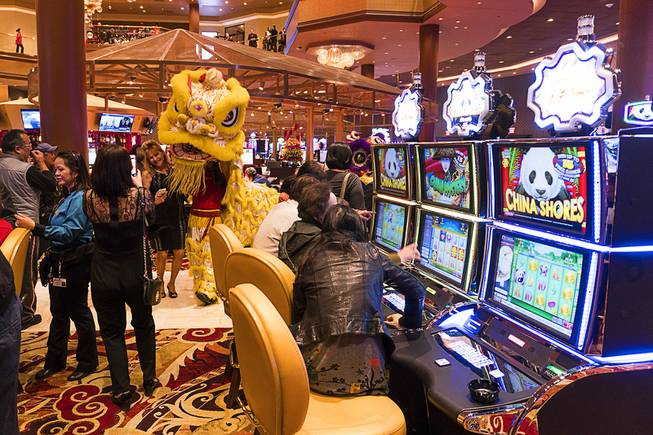
Lucky Dragon guests take photos with the dragon dancers during the boutique casino’s grand opening celebration, Saturday, Dec. 3, 2016.
Published Thursday, Jan. 4, 2018 | 10:22 a.m.
Updated Thursday, Jan. 4, 2018 | 1:31 p.m.
Related Coverage
- More VIP gaming space on the way as Lucky Dragon makes adjustments
- Lucky Dragon, Las Vegas resort catering to Asian market, to open Saturday
- Video: Watch this huge glass dragon being installed at the Lucky Dragon
- How the unique Lucky Dragon casino and hotel came to be
- Lucky Dragon gets final approval
- Lucky Dragon hotel and casino to open in December off the Strip
- Lucky Dragon casino fully financed, will be finished this year, backers say
The Lucky Dragon announced this morning that it is temporarily ceasing gaming and restaurant operations and reducing staff as it begins the process of reorganizing.
The hotel and gift shop will remain open, including room service, morning tea and coffee, officials said. Also, Cha Garden will stay open, featuring a full bar at night and an expanded food menu.
A spokeswoman for the Lucky Dragon said the resort will hire outside firms to run the casino and food and beverage operations, and management is planning to reopen the casino within six months. The hotel will continue to function uninterrupted during that time.
Workers who are laid off will have the chance to rejoin the Lucky Dragon when gaming and additional restaurant operations resume, officials said.
In a news release posted on its Twitter account, the casino did not indicate how many workers would be impacted. The casino has been open just over a year.
“While this is a difficult decision, this reorganization paves the way for Lucky Dragon to establish new partnerships that will enhance the property’s long-term positioning and provide a better guest experience,” the news release stated.
Gaming chips and tickets can be redeemed at the hotel front desk. Any previous gaming, food and beverage promotions are no longer valid, officials said.
The Lucky Dragon opened in November 2016 with a flashy, traditional Asian celebration and a marketing plan that counted on Asian customers.
During hearings before Nevada gaming regulators, then-General Manager Matthew Harkness said the resort would cater to Asians in Las Vegas, California and the Pacific Northwest. The resort was designed using Feng Shui concepts, and signs at the property were written in Mandarin and English.
In March 2017, Lucky Dragon executives said VIP business was so strong they were opening a second VIP gaming lounge to better cater to higher-end players.
The lounge would replace the Pearl Ocean restaurant, which in turn would move into the closed Asian food court on the first floor. But nine months later the proposed new VIP lounge never materialized and the food court remained dark.
At the time, General Manager Jordan Seager, who replaced Harkness, wouldn’t comment on the resort’s finances, only saying the planned changes were abandoned after better uses were found for the empty food court.
Being an independent casino unaligned with a larger gaming company, the Lucky Dragon faced the same challenge as the SLS Las Vegas and the Cosmopolitan Las Vegas — they all opened without a player database.
“That’s a big part of it,” gaming analyst John DeCree said of the casino’s apparent struggles. “It’s something we talk about all the time — a database that can bring in not just customers but high-caliber customers that can be your core business.”
The problems may have been exasperated, DeCree said, by the Lucky Dragon’s reliance on the highly competitive market for Asian customers.
“I think the reality is a lot of the big operators in Las Vegas, Boyd or Red Rock (which owns Station Casinos), they all cater quite well to the local Asian gaming customer, as well as the international Asian gaming customer. And it’s tough for a place like Lucky Dragon with limited space for them to compete with the history players have at other casinos.”
DeCree said reliance on Asian customers brings other risks, too.
“The fixed-cost structure, even for a smaller casino like the Lucky Dragon, is rather large,” he said. “And because the focus was heavily on Asian customers, much of the gaming floor was baccarat, which has lower theoretical win percentage for casinos. It’s also inherently a bit more volatile. So, a smaller casino will have a harder time absorbing a couple of bad periods with lower win percentages.”
If the Lucky Dragon hires an outside company to operate its casino, the new operator would have to reapply for a gaming license and go before the Nevada Gaming Control Board and Nevada Gaming Commission for approval.
Nevada Gaming Commission Chairman Dr. Tony Alamo, who was aware of the impending closing about a week ago, said it is possible, from a regulatory standpoint, for the resort to meet its six-month deadline to reopen the casino.
“It depends on who (the new operator) is,” Alamo said. “If it’s someone who is known to us, it is very doable. If they are not known to us and it requires an extensive investigation, it may not be.”
